
MaXXXine, the third part of Ti West's horror trilogy, hits Cineworld screens on July 5th. To celebrate, we're re-running our 2023 interview with Ti about the previous film in the series, Pearl.
Discover the origins of a cold-blooded killer in director Ti West's visually arresting and operatic horror Pearl, which is on release at Cineworld from March 17th. The movie acts as a prequel to West's acclaimed 2022 slasher chiller X, sketching the twisted and horrific origin story of Mia Goth's titular Pearl, the farm girl turned axe-wielding maniac.
Whereas X depicted the grisly fate of a 1970s porn film crew, who came a-cropper at the elderly Pearl's hands, the new movie is a different kettle of fish, stylistically speaking. Pearl takes place in the early 20th century during the nascent years of the movie industry, and the movie apes the look of a classic melodrama even as the title character goes on the rampage after her dreams of becoming a movie star threaten to not materialise.
The movie takes us inside the head of a memorable, and memorably creepy, character who is vividly brought to life by Mia Goth. We were delighted to catch up with Ti to discuss his collaboration with Goth, his inspirations for the movie and what defines the essence of horror.
The word 'horror' is thrown around quite readily and when I watched Pearl, I personally interpreted it as a psychological story with elements of the horrific in it. What do you make of that interpretation?
Although I didn't think too much about it, I would probably fall more into your description. I was more just focused on making a movie about this character named Pearl. I knew it was going to be violent at times and that would make it horror-adjacent. It would also be psychopathic at times and that would make it related to horror movies.
However, for me, it was more just a story about this odd, unusual girl and that came out how it came out.
Horror has a uniquely communal feel, especially when it comes to the big-screen experience. What do you think is the appeal of the genre as a cinematic entity?
Yeah, that's how movies are meant to be seen. It's always better to see a movie that way, for a couple of reasons. One, yes you're in a crowd and there's a communal experience to it. Two, I've spent a year on the movie meticulously crafting it, and I want it to be seen and heard in a certain way. To then have it potentially projected onto a small screen makes me think, why did I spend all that time on it?
So many people put so much effort into movies, and then to not hear the correct sound frequencies, for example, or to not see elements of the visuals because the movie's presentation isn't sufficient... It prompts questions like, why did I put so many extras in the background of that one scene?
Also, the experience of seeing a movie in an environment that you don't control crafts a completely different experience. That's not to say you can't have great experiences watching movies at home. I grew up with video stores. I probably saw most movies that way. But there's something to be said about seeing a movie in the way it was intended.
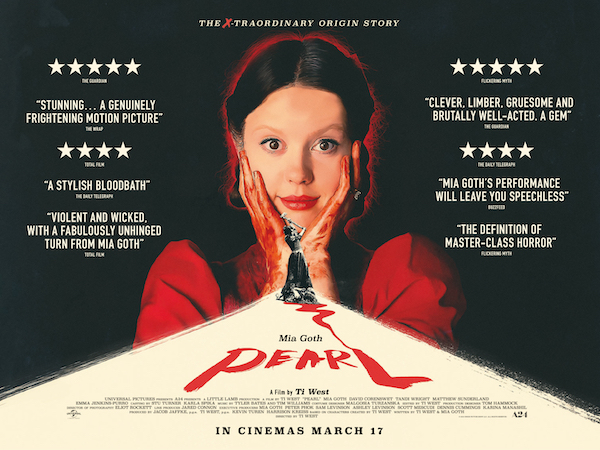
Yes, because the pastiche nature of Pearl, everything from the title design to the colour scheme, is incredibly bold in the way it apes the look of early-20th-century filmmaking, and it demands that big-screen presentation. Was that aesthetic baked into your approach early on?
It was, yeah. That was always the swing we were going to take. I had no desire to make anything that was similar to X. That would defeat the purpose, so I decided to lean into the influence of cinema as a whole, which would distinguish it from X.
What was appropriate for the character of Pearl was this more whimsical, more hopeful, more glamorous perspective on something that was fundamentally dark. That contrast seemed interesting to me.
That was the plan and it wouldn't have worked any other way. When prepping the movie, elements like the wallpaper, the costumes and the kinds of lighting compelled us to just go all in.
There must have been so many technical complexities in getting that look right, I imagine?
It was a weird thing. When you commit that hard to something, everything rises to the aesthetic in a way. The performances, interestingly, found themselves naturally becoming more heightened because they had to match the movie they were in. Otherwise, they would feel false.
It was a strange experience but also a very liberating one because it gave everyone permission to swing for the fences. Hopefully, that shows in the movie.
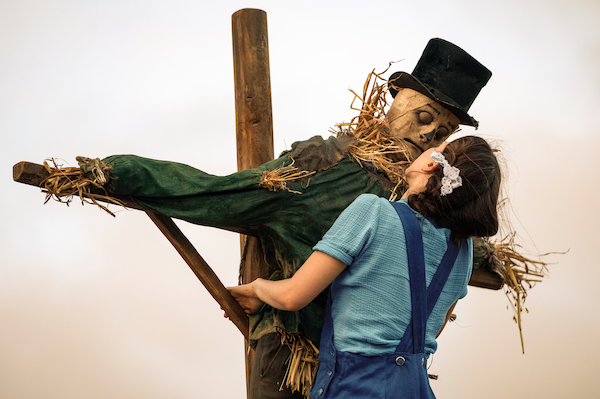
As I understand it, you collaborated with Mia Goth on the script. How did that work?
Well, the majority of the script was written in the two-week mandatory quarantine to get into New Zealand where we were about to shoot X. Mia was in New York and I was stuck in this hotel room and I decided to write a script because there was nothing else to do. I would write stuff and send it to her, she would send things back to me and we would bounce things back and forth.
At the time, we weren't going to make Pearl. It was just an idea. However, there would be no Pearl movie without Mia because she was Pearl and I would have needed her to stay an extra four months in New Zealand to make it. Because she was already portraying the older version of Pearl in X, I felt like even if we didn't pull off making this movie, at the very least we'd sketched out a great backstory to the character.
It would help make her performance as an elderly woman, which is already hard enough to pull off, more concrete in a sense. If nothing else, it seemed like an exercise that would benefit X. However, if we were able to pull it off and make two movies, then great. And ultimately that's what we did, shooting both simultaneously. Knowing that Pearl was going to be a psychologically-driven movie, I know I needed Mia to be as invested as she possibly could.
It hardly needs to be said that Mia Goth is a fearless performer as seen in this movie, in X and elsewhere. How closely do you collaborate with her on the set to come up with ideas?
Some of it happens on the set but Mia is a very practical and detail-oriented person. She always comes very prepared. I'll present her with what I'm thinking and then if it doesn't work we can adjust it. However, Mia comes to it knowing Pearl inside and out. I'm just trying to capture it, really.
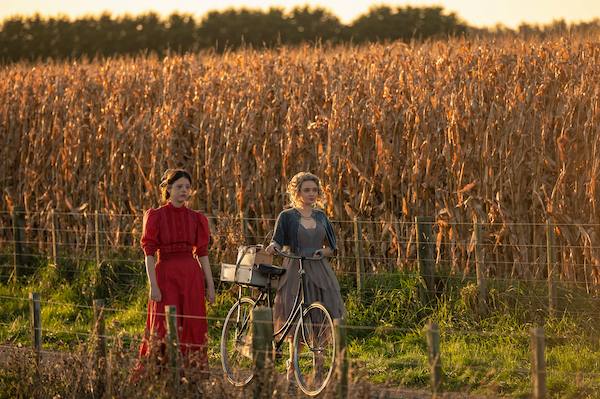
I get a sense that when you make your movies, be it Pearl, X, House of the Devil or something else entirely that you're saluting your formative movie experiences. Is that a fair or accurate assumption?
Somewhat. I definitely think that's a fair comment although that's not how I'm approaching it necessarily. For me, in order to spend two years on a movie, I really need to get lost in it. Getting lost in the aesthetic is an important way of me feeling connected to the movie, whatever that aesthetic may be,
Generally speaking, modern-day settings are not that appealing to me because one ends up with a lot of photography of technology. Pearl is certainly influenced by the Golden Age of Hollywood – Douglas Sirk, Disney and all these sorts of things. But for me, to be on a set where we're putting someone in a red dress in front of red wallpaper in front of fake trees... It creatively pushes me to be fully invested in it.
I feel like I'm in the world of this movie and the movie has an identity. It's motivational and inspiring. To not do that and for it to just be about plot... That becomes a bit of a grind, especially given how tedious movies are to make. I'm just always looking for ways to get lost in a project.
In Pearl, the title character bears witness to cinematic technology being used in certain ways. I found that fascinating. The movie almost becomes a meditation on fantasy albeit undercut with reality.
Yeah, I looked at X as a movie about people trying to do it for themselves. They're trying to make themselves famous. They're trying to make their career outside of the main movie business system. In X, if they're unhappy with their lives, they're doing something about it. They're finding their own way instead of relying on the Hollywood route.
That approach doesn't really exist in the world of Pearl. In Pearl, we have a character who, if she's unhappy with her life, looks at what the movies offer as if it's on a pedestal. It's a more hopeful and dream-like perspective. That's something people can relate to. In X, if you want to make movies, you can go out and independently make them yourself. Or you could dream about yourself living a life in the movies.
Both of those are examples of how cinema affects us. The third movie, MaXXXine will do the same just in a different way.
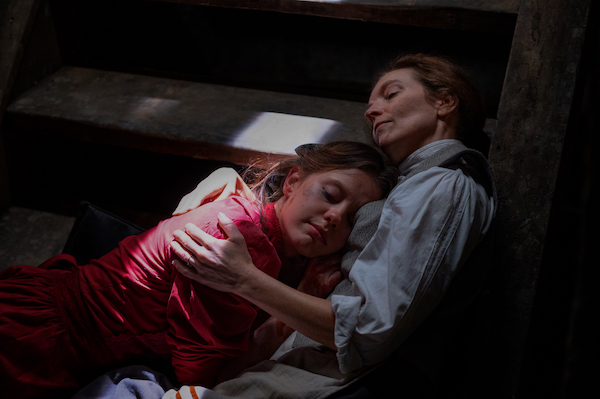
I love Tyler Bates' score for Pearl, especially the retro melodramatic sound of it. The music adds so much to our understanding of what's going on inside Pearl's head. I imagine that's the intention of any great film score, right?
I love Tyler. When we were doing X, it was a stripped-down score and it was great, and [singer-songwriter] Chelsea Wolfe was amazing. I then said to Tyler, 'So for the other movie, it might be a little different...' He was already game for both but I then told him that here's the thing: 'We might need a full orchestra and 80 minutes of music.' He then replied, 'Hmmm, that is a thing.' [laughs]
But full credit to Tyler, he never flinched. It sounds awesome. He and Tim Williams, who came in and worked on the score as well, delivered above and beyond what I could have ever imagined. So much of the identity of the movie is the score. We recorded with a 65-piece orchestra and it was a real pleasure. I'm really proud of their work.
It's a testament to Tyler that, ordinarily, people are not coming to him to do that kind of romantic, 1940s-era orchestral score. But Tyler jumped at the opportunity. He loved that I approached him to write this music. It was a chance for him to do something that he doesn't get to do every day.
Mia Goth has the responsibility of delivering a remarkable, eight-minute monologue toward the end of Pearl. I imagine that says a lot about a filmmaker's faith in their lead performer. Was that scene always there in your mind?
That was always the plan, to do this monologue as the climax and to do it close-up, unbroken, in one take. I didn't know if we'd be able to do it. I had reverse shots lined up just in case. But when it came time to do it, the sequence really was on Mia's shoulders. All I tried to do was stay out of her way.
It's a relatively long scene and there's a point where it stops intercutting between Pearl and the character of her sister-in-law, Mitzi, to just stay on Pearl. So when we were shooting it, we were shooting it right through from the moment they came in and sat down all the way through the subsequent monologue. There were four minutes prior to Pearl's speech that was just 'normal'.
I then said to everyone, 'If anything is going to go wrong, you have to identify it in those initial four minutes... The moment a certain phrase is said, we're off into the monologue part.' And we were all holding our breath because this is like doing a stunt. If someone had to sneeze or if we ran out of battery, those first four minutes were crucial for rooting out those issues.
Those things have to be resolved before we cut to Pearl because the stakes are too high to have something go wrong after that. The crew was really great about it and we did five or six very long takes in the end. Mia nailed it every time.
We've just had the 95th Academy Awards where horror and thriller movies have again been routinely overlooked. I know Mia has spoken about this oversight and wondered what your thoughts were? Is it time for the genre to be re-evaluated in those awards terms?
I don't know. Look, I'm biased because I'm really proud of Mia's performance. It's been really nice and endearing to hear people rally around Pearl and Mia's performance in particular. It's been a cool experience that I've not had before. I would like as much success for her as possible.
It would be nice to see unexpected movies being included in that sort of thing. It depends what you put value on, I suppose. Don't get me wrong, if she'd been nominated for an Oscar, we would have been very excited. [laughs] But not being nominated for an Oscar and discovering that people still like the movie? That's totally fine.
There's no shortage of incredibly kind people with whom Mia and myself have interacted over the last year. Honestly, I have no doubts that she'll find herself in the awards space, sooner or later.
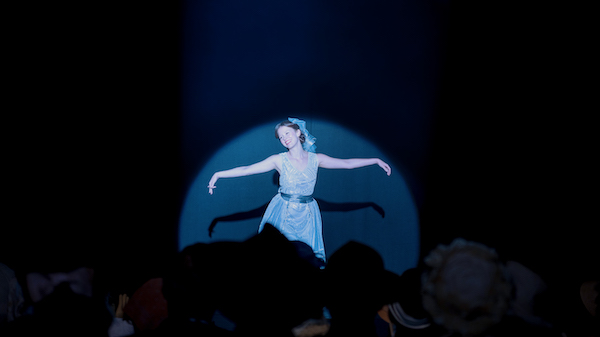
I've already mentioned your 2009 movie House of the Devil, which has long been a cult horror favourite of mine. There's a particularly memorable scene involving an early appearance from Greta Gerwig – fans will know what I mean. How did that shocking moment come about?
You have a sense of timing in your head, I suppose. You're always trying to get that timing to feel right. If it feels right to me, and I know what's coming, chances are it'll feel right to someone who doesn't know what's coming. Sometimes it's easy getting that right and sometimes it's tricky.
That particular scene was tricky. Greta had come from a very improv-heavy background and so I needed a gap with absolutely no talking over it whatsoever. It was such a pivotal moment in the movie that it had to land in a certain way. I had to tell her to act distracted so something could happen and then hold off and leave a gap so the next thing can happen.
There is a difficult thing at play there given I'm the one pulling the strings on the movie. On that movie, we probably only did it two or three times as we didn't have that much time or money. That's the moment where the movie changes gears and it was all about, 'The moment where you light the cigarette is when it happens', and nobody must see it coming. Otherwise, the scene doesn't work.
So, it's about trying to make it organically seem like she doesn't know what's coming, although, of course, she does.
It's trying to make something that's very mechanical and thought-through on the set feel spontaneous and surprising for the audience.
Absolutely. The process is a hard thing to articulate. The only thing capable of articulating it is the movie itself. I would ordinarily just divert people to looking at the film, which says everything. It's a very timing-oriented thing and it applies to both X and Pearl as well.
As an example, at the end of Pearl's monologue, she looks up and we cut to Mitzi. I remember telling Mia to do her thing on the monologue but when it was over, I told her that she must look up. Because if she didn't, I would have no way out of that moment. I said that she could take as much time as she need, but she absolutely had to look up.
Every single take, she was amazing, but in my head I was like, 'Please look up, please look up...' Because that's the way out and back into the movie. She went on this, like, transcendental journey for eight minutes and as the director, I'm like, 'I hope she still remembers she's in the movie.'
From my point of view, I love the movie's adventurous sense of style and tone. To wrap up, what do you hope audiences will take away from the movie when they see it?
It's just nice when people like the movie. I'm not going to put that much on people to feel a certain way. If anyone watches the movie more than once, I really appreciate that. Hopefully, that means it's landed with people and there's more to be seen. That's always great.
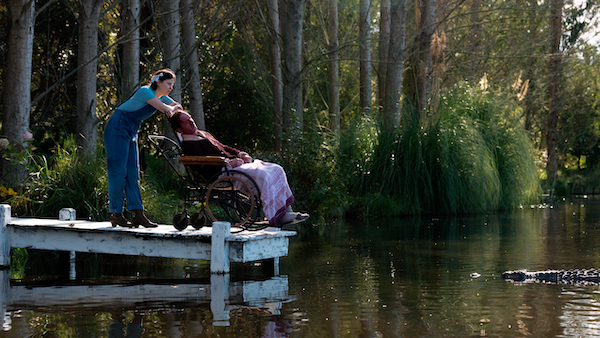
Click the link below to book your tickets for MaXXXine, releasing at Cineworld on July 5th.






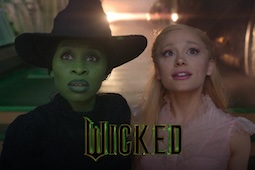



.jpg)


.jpg)
.png)






